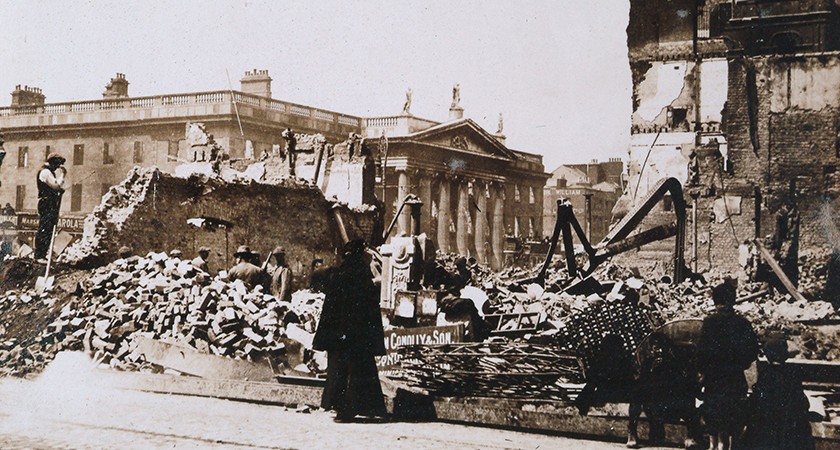THE CENTENARY of the 1916 Rising will be commemorated in buildings of cultural significance across Britain next year.
Ireland’s Minister for Foreign Affairs Charlie Flanagan launched the highly anticipated programme of events for the commemorations at the Irish Embassy in London on November 23.
In total, 87 events have so far been announced, with the potential for further events to be added to the list.
Places like Glasgow, Birmingham and London will all hold special events to mark the milestone in the history of Ireland.
And venues of “cultural significance” have been chosen.
Speaking at the launch, Minister Flanagan said: “The programme will take place in venues across Britain – from institutions of major cultural significance like the Southbank Centre, Wigmore Hall and the Barbican, to community spaces from Glasgow to Camden to Liverpool.”
The Easter Rising took place from April 24 to 29, 1916, mainly in Dublin.
In Ireland, sites of major importance to the Rising, such as the GPO on O’Connell Street, will play a major part in the country’s commemorations.
All of the events scheduled to take place in Britain come under the five themes of remember, reconcile, present, imagine and celebrate.
“This is an exciting and busy programme,” Minister Flanagan said.
Scroll down to see some of the events below...
“It offers an occasion to reflect on what happened in Ireland a century ago and on its impact on relationships on these islands.
“These reflections will also acknowledge the richness and complexity of these historical events by focusing on their cultural, academic, economic and artistic strands, as well as the broader political narrative.”
Of the 87 projects and commemorations, 19 of them have been funded by the Department of Foreign Affairs’ community funding project.
Plans were revealed for Irish centres and groups up and down Britain which will take place from January to commemorate the landmark anniversary.
And these events give Britain and Ireland a chance to reflect on the “complexity” of both countries’ history, Minister Flanagan said.
He also went on to commend the Irish community in Britain, confirming his stance that the diaspora should be engaged with.
“Reaching out to and engaging with our Irish diaspora is a key strand of the 1916 commemorations, including recognising their contribution to Ireland over the last 100 years,” he said.
Among the highlights of the year in Britain is a series of events being organised by the Irish Embassy to explore the life of Roger Casement, a British diplomat who was a key figure in Ireland’s fight for independence.
Liverpool’s unique role in the Rising will also be a highlight of the year in Britain – with events planned by the city’s Irish groups from January.
“This is a moment of great opportunity to reflect on and advance further the productive journey of reconciliation on which our two countries have been embarked for some years now,” Minister Flanagan concluded.
See just some of the highlights here:
The Photographers’ Gallery, London (January to April 2016)
Easter Rising 1916, Seán Sexton Collection. A selection of eight rare photographs and paraphernalia will be on display.
The Barbican Centre, London (March 2016)
A suit of music from an orchestra of 55 people, this musical project will reflect on this moment of Irish history.
Manchester Irish Writers, 1916 The Risen Word (October 2015 to March 2016)
A series of workshops and lectures on topics related to the Rising.
Irish Tuesday Club Liverpool, Hands across the Water 1916-2016 (April 2016)
A day of music, song, film and dance focused on Liverpool’s contribution in 1916.
Tyneside Irish Cultural Society, Brothers in Arms (June 2016)
A short musical play set in the Irish National Club in Newcastle between October 1914 and August 1916.


